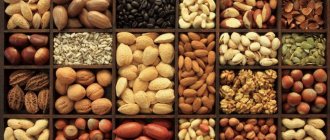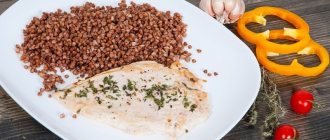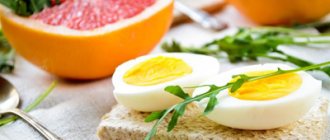Is it possible to give up meat and become a vegetarian without harm to your health? Where to begin? Many vegetarians would probably laugh kindly at this question and ask a counter question: “How can you remain a meat eater without harm to your health?”
Most people who switch to a vegetarian or vegan diet report improved health (confirmed by tests), increased performance and energy levels, notice that they look better and feel better.
Many people are aware of the benefits of vegetarianism and support it from an ethical point of view, and even try to give up meat for a while, but soon return back to old habits.
How can you become a vegetarian, so that you don’t have a painful desire to eat at least a small piece of sausage or barbecue, so that you don’t feel drawn to old habits?
How to become a vegetarian - where to start, so that it’s easy Secrets of a gentle transition to a new diet Why you can’t completely give up meat at once How to replace meat The magical properties of spices Do I need vitamins or dietary supplements Why do they always offer me meat? Personal experience: 30 years of vegetarianism 6 best recipe books for vegetarians
How to become a vegetarian - where to start to make it easy
Let’s first look at what “thin” and “dense” nutrition is. Food that is digested easily and quickly is fine nutrition, and food that takes a lot of time and energy to digest is dense nutrition. The lightest and most subtle nutrition is freshly squeezed juices. Next come fruits, berries, raw vegetables, cereals and cereals, cooked vegetables growing underground (potatoes, carrots, beets), legumes, dairy products, and finally fish and meat.
The closer a nutrient is to the sun, the easier it is to digest and the more energy it is filled with. Plants receive the energy of the sun directly, while animals receive it indirectly, so there is less subtle energy in meat. The most energy-filled foods are fresh fruits, vegetables and sprouts.
If you are used to eating meat or fish every day, you don’t need to rush into the now popular “detox” and immediately switch to juices, fruits and sprouts. Maybe you can live like this for a few days, but then it will become difficult for you - irritability will appear, everything around you will make you angry. In addition, if you suddenly switch to a very light diet, the process of cleansing the body may go too quickly, and you will not feel very good for some time.
How and how like-minded people can help
“The environment shapes our consciousness” is not an empty phrase. A person sooner or later succumbs to the influence of those who are nearby. If you want to change, start with your social circle.
Now you need people through whom personal transformation will occur. They will support and answer questions, of which there will be many.
You can find like-minded people on vegetarian, vegan, Vedic forums and sites where participants share their stories, exchange experiences and information.
Vegetarians often organize various events, holidays, festivals, why not visit them? There will be a chance to personally communicate (even better, make friends) with such people, listen to lectures, take part in master classes on preparing raw food dishes, and receive a powerful energy and information charge.
What household appliances are necessary for a vegetarian?
If you are determined to lead a healthy lifestyle, you will definitely need a number of devices. I will name them and provide links to our review articles for each device. It tells you how to choose and use them correctly.
- Devices that improve water quality: distiller (purifies water by evaporating it), ozonizer (purifies, structures water), ionizer (saturates water with ions), water filter (cleanses harmful impurities).
- Juicer for making berry, fruit, vegetable and herbal juices.
- Blender (multifunctional device) for chopping, beating, slicing, mixing vegetables, fruits, berries, herbs and other products. Either a mixer (mixes and beats), a food processor (replaces a blender, mixer, juicer, mill).
- The dehydrator and oven will provide dried fruits, dried vegetables, and herbs all year round.
- The bread maker allows you to bake yeast-free bread with various additives.
- The oil press will provide fresh, high-quality hot or cold-pressed oil from nuts and seeds.
- Melanger (urbech-maker) for grinding seeds, nuts and spices (grinds products into paste with millstones), preparing urbech, nut pastes, coconut flakes, homemade chocolate from natural cocoa beans.
- Coffee grinder and/or hand mill for grinding salt, spices, herbs, seeds, nuts. Grind cloves, mustard peas, pepper into allspice powder, and seeds into flour.
- Sprouter (sprouter) for germinating seeds, grains, legumes and growing any greenery in the apartment.
Where to get protein?
There is one common myth among opponents of vegetarianism that if you give up animal foods, you will inevitably experience a protein deficiency.
Non-strict vegetarians include dairy products and eggs, thereby satisfying the body's protein needs.
However, a properly balanced vegetarian, and more strict vegan, diet, due to the variety of plant foods, can fully provide the body with protein. To do this, you need to include the following products in your diet:
- Spirulina is a type of evergreen algae that grows in tropical and subtropical lakes with high pH. According to WHO, it contains about 60% complete protein , including all essential amino acids. It contains a large amount of B vitamins (1, 2, 3, 6, 9); vitamins C, D, A, E; trace elements: calcium, chromium, phosphorus, zinc and others. The iron content in it is 34 times more than in spinach, and 25 times more carotene than in fresh carrots. Additionally, a 2014 study found that spirulina contains “pseudovitamin B12,” i.e. components are very similar to the essential vitamin.
- Combination of oat and pea proteins . It is in this combination that the amino acids contained in them optimally complement each other. This “cocktail” can be successfully used by athletes, children and elderly people as a complete or partial replacement for animal protein.
- Legumes , especially soybeans, are famous for their high protein content. Soy is most often used as a replacement for animal products: soy meat and soy analogues of semi-finished meat products, tofu (soybean curd), soy milk and even butter are used. Soy is rich in B vitamins, beta-carotene, macro and microelements. It contains essential amino acids and polyunsaturated fats.
- Pseudograins: buckwheat and quinoa . They contain more protein than any grain. The amino acid composition of quinoa is close to the composition of milk. These crops do not contain gluten.
How can a vegetarian substitute eggs for baking?
For many, giving up eggs themselves is not difficult, but they are often a mandatory component for various recipes, such as pancakes, pastries, cutlets, potato pancakes, meatballs, and omelettes. Fortunately, nowadays eggs can be easily replaced. Here are some egg substitutes for vegetarians:
- Flax seeds . For preparation you will need 1 tablespoon of flax seed flour, 3 tablespoons of water.
- Aquafaba . The liquid left over from cooking beans. You can make it yourself, or drain it from a can of canned peas. 30 ml replaces one egg.
- Starch . It has sufficient viscosity to hold cutlets and meatballs together and is used in baking. To prepare, you need water and starch in combination, for 1 serving of starch - 2 servings of water. One tablespoon will replace one egg.
- Semolina . 3 tablespoons of semolina replace a full egg. Can be added to baked goods, casseroles, cutlets.
- Agar-agar . 1 tablespoon will be enough.
- Peanut butter . Used for baking, makes it softer.
Eating out
Surely in your city there are places where you can eat as a vegetarian. Generally, in most major cities there are plenty of vegetarian restaurants to choose from. And even in small towns there are surprisingly decent cafes for vegetarians.
If there are no specialized vegetarian restaurants in your city, suitable dishes can be found on the menus of other establishments, depending on the cuisine they offer.
Vegetarian food selection
Vegetarian cuisine of countries and peoples of the world is represented by a variety of dishes. Their taste may be unusual due to the use of products typical of a particular country and the peculiarities of national recipes. When in a restaurant, the first thing a novice vegetarian thinks about is where to start getting acquainted with the cuisine so as not to break the diet.
When choosing food in an ethnic restaurant, keep in mind that dishes that seem vegetarian at first glance may contain animal ingredients.
Middle Eastern cuisine. In Middle Eastern cuisine, in addition to meat, there is a large selection of plant-based dishes, and eggs and dairy products are rarely used (the exception is Tzatziki, a yogurt-based cucumber sauce).
Mexican cuisine. Mexican food has every chance of being called vegetarian, but be careful, lard can be added to tortillas or bean dishes, sour cream to guacamole, and chicken broth to rice dishes.
Chinese cuisine. When visiting Chinese restaurants, remember that chicken broth is often used to prepare dishes.
Ethiopian cuisine. Ethiopian restaurants are not common, but if you find one, try their vegetarian food. Ethiopian cooking is largely based on meat, vegetables and grains. Avoid meat dishes and make sure vegetables are cooked without butter.
Tips for a novice vegetarian to achieve what they want:
- Move towards your goal in a way that is comfortable for you, and at your own pace.
- Explore new vegetarian dishes and flavors more often.
- Be more interested in nutrition and the absorption of nutrients to prevent vitamin deficiency.
- Buy natural vegetarian products from health food stores, online stores, and farmers' markets. If this is not possible, then the nearest supermarket will probably have the necessary products.
- You can eat vegetarian not only at home. Be it a vegetarian restaurant or any other cafe, almost everywhere you can find something that will suit your chosen diet.
- Equip your kitchen with functional kitchen appliances, this will make cooking faster and easier.
- To get started, use easy recipes for vegetarian dishes, and remember: tasty and satisfying food does not mean it’s difficult to prepare.
Advantages and disadvantages
There are eight hundred million vegetarians in the world. Many nutritionists argue that vegetarians' diets are not properly balanced, which has a negative impact on health.
The main complaints are chronic protein deficiency, while an excessive amount of carbohydrates enters the vegetarian body.
Vegetarians lack vital vitamin B12 ; the body does not generate it; it comes only from the outside with animal products. This component promotes the restoration and proper development of cells.
Vitamin D is one of the basic elements; its deficiency leads to bone deformation, rickets and osteoporosis.
B2 - riboflavin - is completely absent from the diet of fans of plant foods; a person without B2 becomes apathetic, lethargic, and concentration and memory are impaired.
Beginning vegetarians need some recommendations so that the adaptation process takes place without harm to the body:
- you should give up smoking and alcohol;
- you can and should take additional multivitamins and microelements;
- at an early stage, eat some meat products once a week;
- calcium deficiency should be replenished by eating large amounts of green vegetables, iron - by introducing apples, persimmons, and pomegranates into the diet;
- eat food 5-6 times a day in small portions.
Before you become a vegetarian or vegetarian, you need to understand where to start.
Proper vegetarian diets contain a minimum amount of cholesterol, which has a detrimental effect on the cardiovascular system. In any case, the diet must be reasonably balanced, otherwise there is a risk of chronic diseases. Before switching to a new way of eating, be sure to understand all the rules. Consult with your doctor, read books, take the necessary tests. It is recommended to start practicing a new way of eating gradually.
Useful tips from experienced vegans
To make the transition to veganism less traumatic (both for the body and the psyche), you should listen to the following advice:
- There is no need to give up your favorite foods. Their vegetarian versions are in most cases no less tasty and incomparably healthier.
- Change your diet and lifestyle gradually. You don’t need to immediately revamp your entire menu or throw out every item from your house that contains even a small piece of genuine leather. It is enough if you give up meat step by step and refuse to buy new leather and fur clothes.
- Pay attention to your body's needs. He himself will tell you what you are missing - and all you have to do is correctly interpret these signals.
This is not the easiest diet, but it is easy to follow if it is based on sincere beliefs
- Focus on positive results. Veganism is not about giving up meat, veganism is about adopting a new, more ethical way of life. View all changes as gains, not losses.
- Get support. In your immediate circle, find those who, if they do not share your views, at least recognize their right to exist. Don’t be shy to ask for help: truly close people will support you, and will not try to quietly feed you cake or meatballs.
- Do not agitate others, at least in the early stages. Many novice vegans behave aggressively, but it should be remembered that veganism is a conscious choice for everyone. It cannot be forced: everyone comes (or does not come) to such a decision on their own.
What are the advantages?
Among vegetarians, there are practically no people suffering from cardiovascular diseases, hypertension, or diabetes.
Uric acid diathesis and appendicitis do not occur in vegetarians, and stones in the kidneys and gall bladder occur less frequently. Most centenarians are vegetarians. Vegetables and fruits, which vegetarians usually eat in abundance, are rich in vitamins and minerals, which help improve immunity. In addition, plant foods contain phytoncides that suppress putrefaction processes in the intestines, improve the functioning of the gastrointestinal tract, and not only do not contain cholesterol, but also promote its elimination. Antioxidant vitamins – A, C, E, contained in vegetables, fruits and herbs, serve to prevent cancer.
Cereals, especially buckwheat and oatmeal, are rich in vegetable proteins, dietary fiber, B vitamins, vitamin E, and minerals.
Nuts contain many valuable unsaturated fatty acids that lower cholesterol levels. He who eats nuts takes care of his heart. Professor Christian Barnard in his book “50 Ways to a Healthy Heart” cites an interesting fact: people who regularly eat about 150 g of nuts a week have a heart attack one third less often than those who do not eat nuts.
Varieties
Nowadays there are about 10 types of diets in vegetarianism, which directly depend on the products chosen.
- Classic - meat products and fish are prohibited. Milk, cheese, kefir, honey, eggs are actively used in the diet.
- Veganism – adherents of this trend consume only plant products. Veganism excludes all types of violence towards animals. Vegans do not use cosmetics or wool clothing, they do not eat cheese, honey and many other foods.
- Lacto vegetarians eat dairy products. Today it is the most popular type of vegetarianism . “Lakto” translated means “milk”.
- Ovo (Latin for “egg”) eat eggs and honey, but avoid dairy products.
- Raw foodists. They eat only raw food, fundamentally refusing to cook it. A raw food diet involves consuming foods without sugar, salt or spices. Food is consumed only after drying in the sun or in a dehydrator, as well as in an oven at a temperature of about 43°C. There are also several subtypes of raw foodists:
- Fruitarians use only plant fruits in their diet.
- Mono-eating – eating only one food item at a time
- Mixed raw foodists can eat any, naturally only raw, foods
- Liquid nutrition . Mainly as short-term fasting days. Only liquid products are included: juices, soups, smoothies, tinctures.
- reductionism has become increasingly fashionable ; this is a trend of vegetarianism, which is based on the statement: everything is good and healthy to consume in moderation. The idea has captured the masses on all five continents; many people want to become a vegetarian, but not everyone is ready to follow the strict diets of vegans or conservative vegetarians.
- Pescetarians - do not eat poultry or animal meat, but include fish dishes.
- Pollotarianism – only mammal meat is excluded.
- Flexitarians sometimes eat meat and fish.
Strictly speaking, the last three categories are not classic vegetarians.
The reasons for the emergence of veganism are the existence of a life credo, which in many ways resembles religious views. A vegan is disgusted not only with the use of clothing and products of animal origin (gelatin, rennet, albumin, leather, fur, silk and others), but also with cosmetics, household chemicals or medicines tested on animals.
Vegetarians have slightly different ideological positions; the correct use of plant foods, in their opinion, significantly reduces the load on the planet’s resources and has a positive effect on the climate.











